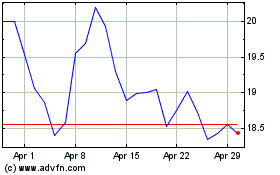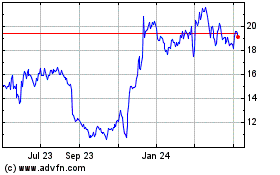By Suzanne Kapner
Macy's Inc. said it will slash more than 10,000 jobs and
detailed plans to close dozens of stores after another holiday
season of weak sales, providing more evidence that department
stores have lost their once-central place in American
retailing.
Like its rival, Kohl's Corp., which also warned Wednesday of
lackluster holiday results, Macy's hasn't been able to solve
consumers' shift to online shopping. Macy's will close stores from
San Diego to Bangor, Maine, and use the savings to boost its
efforts to capture more e-commerce spending.
"We are closing locations that are unproductive or are no longer
robust shopping destinations," Chief Executive Terry Lundgren said
in a statement, adding that the company could make money off highly
valued real estate.
On top of eliminating about 3,900 jobs with 63 store closings
this spring -- part of a plan announced last summer that will
shutter about 100 locations -- Macy's will cut about 6,200 other
positions to streamline operations so it can invest more in digital
efforts and other growth areas such as the expansion of its
Bluemercury beauty outlets and Macy's Backstage off-price
concept.
Analysts generally expect the recently completed holiday season
to be a strong one for U.S. retailers, helped by higher wages,
lower gas prices and rising employment. The National Retail
Federation, for instance, expects retail sales increased 3.6%, more
than the 3% gain of a year ago. But much of the growth has come
online. Mastercard SpendingPulse estimated that e-commerce spending
jumped 19% during the holidays, compared with an overall 4%
increase in retail spending.
But department stores face particular challenges given their
large size and dependence on brands, which now have their own
retail stores and online venues that compete with the big box
chains, as well as price pressures from fast-fashion retailers such
as H&M and Zara. Also, analysts say demand was stronger for
gadgets and toys than for the apparel and handbags that fill much
of department stores.
On Wednesday, Kohl's warned that holiday results were weak,
saying comparable sales declined 2.1% in the months of November and
December from a year ago. The chain, which operates 1,100 stores,
lowered its profit targets for the current year.
"Strong sales on Black Friday and during the week before
Christmas were offset by softness in early November and December,"
said Kohl's CEO Kevin Mansell.
Shares of Kohl's tumbled more than 12% in late trading, while
Macy's fell 8%. The news pressured other retailers, with Nordstrom
Inc. and J.C. Penney Co., also trading lower after the market
closed.
Macy's said its sales declined 2.1% on a comparable store basis
in November and December from a year ago. Assuming, business
doesn't pick up considerably in January, it would mark the eighth
consecutive quarter that Macy's sales have declined on that basis.
Macy's lowered its per-share earnings goal for the current fiscal
year, which ends Jan. 28, to a range of $2.95 to $3.10 from a
previous estimate of $3.15 to $3.40.
Mr. Lundgren, who is preparing to step aside as Macy's CEO this
year, said he expects 2017 sales to decline at a similar rate to
the company's holiday performance. The company has ramped up its
digital efforts and Mr. Lundgren said the company's online sales
were strong this holiday, but Macy's continues to "experience
declining traffic in our stores where the majority of our business
is still transacted."
The retailer, which also owns upscale department store
Bloomingdale's, is only closing Macy's locations.
Macy's said the latest store closings would result in a $250
million charge in the fourth quarter and reduce its 2017 revenue by
about $575 million. However, Macy's expects the closing to result
in annual savings of about $550 million.
"The big thing we're focusing on is what should our stores look
like going forward?" said Karen Hoguet, Macy's chief financial
officer, in an interview.
Ms. Hoguet said that Macy's will be testing a variety of new
strategies this spring.
She added that the addition of Macy's Backstage, a discount
concept similar to T.J. Maxx, to existing Macy's department stores
has helped boost traffic. As a result, Macy's plans to add 50
Backstage locations to department stores over the next few years.
The company has also been exploring options for some of its
flagship properties such as its Herald Square store in New York
City.
Ms. Hoguet said that despite the challenges, brick-and-mortar
locations will continue to be crucial to retailers. "Research tells
us that customers are visiting stores, and then buying online."
Other retailers, including Wal-Mart Stores Inc. and Sears
Holdings Corp., have tried to adapt to the shift by closing weaker
locations and trying to compete with Amazon.com Inc. for customer
loyalty.
Wal-Mart closed more than 100 U.S. stores last year and agreed
to spend $3 billion to last fall to acquire online retailer
Jet.com.
Write to Suzanne Kapner at Suzanne.Kapner@wsj.com
(END) Dow Jones Newswires
January 04, 2017 19:29 ET (00:29 GMT)
Copyright (c) 2017 Dow Jones & Company, Inc.
Macys (NYSE:M)
Historical Stock Chart
From Mar 2024 to Apr 2024

Macys (NYSE:M)
Historical Stock Chart
From Apr 2023 to Apr 2024
